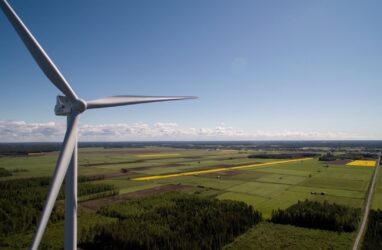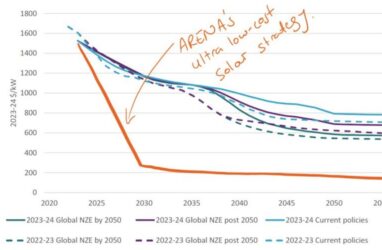Feed aggregator
Engie offers $1000 energy bill rebates to neighbours of wind and solar projects
The post Engie offers $1000 energy bill rebates to neighbours of wind and solar projects appeared first on RenewEconomy.
Mining giants look to dump gas and diesel in Australia’s most fossil dependent grid
The post Mining giants look to dump gas and diesel in Australia’s most fossil dependent grid appeared first on RenewEconomy.
Curious Kids: why can some plastics be recycled but others can’t?
New Zealand utility to shut carbon, gas trading platform due to lack of interest
NZ Climate Change Commission chair to retire
Australia’s ultra cost solar goal could change everything about the grid
The post Australia’s ultra cost solar goal could change everything about the grid appeared first on RenewEconomy.
Brazil names managing partners to oversee Amazon forest restoration programme
We tested landscaping supplies on sale in Sydney stores for asbestos – it came back positive
Exclusive: Independent testing of recycled soil fill for sale finds two of four samples would not meet legislated thresholds, and one contained asbestos
Asbestos has been found in recycled soil fill for sale in New South Wales landscape and garden stores, more than a decade after investigators first raised concerns about contamination.
Guardian Australia bought four products at Sydney landscape supply shops and had samples analysed by accredited private laboratories.
Continue reading...Overcoming the overcast: Climate data firm details how persistent cloud cover hampers tropical forest carbon mapping
Bowen accuses Dutton of dodging proposed nuclear sites
The post Bowen accuses Dutton of dodging proposed nuclear sites appeared first on RenewEconomy.
Licence to probe: the liberating beauty of fiction after journalism | Michael Brissenden
Cut free from the constraints of reporting, a story can take its own shape, can lead you down rabbit holes you’d never expected
During my nearly 40 years as a journalist, the climate crisis has been a constant, creeping refrain – from the first greenhouse conference in the late 1980s and the first IPCC report in the early 90s. There was the Hawke governments’ plan to cut emissions by 20% below 1988 levels by 2005, and the subsequent walking back of that plan.
Then on through the decades of bitter political division and debate and policy failures; the proposal for an Emissions Trading Scheme under John Howard; Kevin Rudd’s “great moral challenge of our generation”; the ill-fated Carbon Pollution Reduction Scheme, the Gillard ETS, the relentless campaign against it by Tony Abbott and the wasted decade of what’s become known as the “Climate Wars” that followed.
Continue reading...‘It’s honest beauty’: the net-zero homes paving the way for the future
As demand for sustainable housing grows, architects go back to basics to future-proof homes for a changing climate
- Follow our Australia news live blog for latest updates
- Get our morning and afternoon news emails, free app or daily news podcast
“Energy efficient”, “carbon neutral” and “net zero” are buzzwords we hear more and more as we face the impact of climate change. But do we think about them enough in building?
Globally, a move towards sustainable housing is growing. In Europe, efforts to move to greener homes hope to combat rising energy costs and be better for the planet. But 40% of global carbon dioxide emissions still come from the real estate sector.
Continue reading...‘A catastrophe’: Greenpeace blocks planting of ‘lifesaving’ golden rice
Thousands of children could die after court backs campaign group over GM crop in Philippines, scientists warn
Scientists have warned that a court decision to block the growing of the genetically modified (GM) crop golden rice in the Philippines could have catastrophic consequences. Tens of thousands of children could die in the wake of the ruling, they argue.
The Philippines had become the first country – in 2021 – to approve the commercial cultivation of golden rice, which was developed to combat vitamin-A deficiency, a major cause of disability and death among children in many parts of the world.
Continue reading...Thames Water tests for vomiting bug contamination as families fall sick
Exclusive: after cryptosporidium outbreak in Devon, residents in south-east London report stomach cramps and diarrhoea
Thames Water has sent samples of water for lab testing after dozens of people reported becoming unwell with stomach cramps, vomiting and diarrhoea in south-east London.
Earlier this month, unsafe drinking water led to more than 100 cases of a waterborne disease in Devon, with people asked to boil their water because of contamination fears.
Continue reading...The Maldives faces existential threat from a climate crisis it did little to create. We need the world’s help now | Mohamed Muizzu
Small islands like ours face an uncertain future. We can adapt – but climate finance that we badly need must be unlocked
- Mohamed Muizzu is the president of the Maldives
For the Maldives, the existential threat of the climate crisis, particularly sea level rise, has been a reality we have grappled with for decades. In 1989, recognising the urgency of our situation, with our islands standing just one metre above sea level, we brought this issue to the global stage for the first time.
This early recognition of our vulnerability sparked a national transformation as we embarked on proactive climate resilience and adaptation measures. Thirty-five years later, has the rest of the world truly been listening? If you look at how the world’s reaction to the climate crisis is funded, the answer is clearly “no”.
Continue reading...Stripe launches fellowship programme to support ideas to boost carbon removal demand
Nearly 175 arrested as climate protesters target France’s TotalEnergies and key investor
Demonstrators gathered outside Paris meetings of energy giant and Amundi, with some forcing their way into fund manager’s tower block
The head of TotalEnergies has told shareholders that new oilfields have to be developed to meet global demand, as the annual meetings of the French energy giant and one of its biggest shareholders were picketed by climate activists.
Police said they detained 173 people among hundreds who gathered outside the Paris headquarters of Amundi, one of the world’s biggest investment managers and a major TotalEnergies shareholder.
Continue reading...






